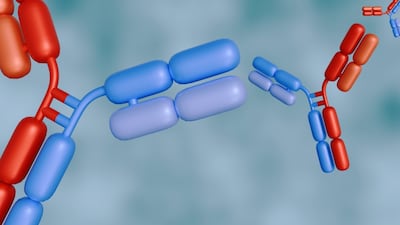Anticancer
Interim results from the Phase III REMARK study presented at WCLC showed the Chinese company’s second-generation ALK/ROS1 inhibitor met its primary endpoint as a first-line therapy in ALK-positive advanced NSCLC.
Pipelines in bioconjugates continue to develop, from ADCs to XDCs, with radionuclide drug conjugates (RDCs) and antibody-oligonucleotide conjugates (AOCs) leading the expansion.
Interim results from the Phase III REMARK study presented at WCLC showed the Chinese company’s second-generation ALK/ROS1 inhibitor met its primary endpoint as a first-line therapy in ALK-positive advanced NSCLC.
The US precision medicine company hopes its drug response predictor technology will enhance responses to the chemotherapy Ixempra on the basis of promising data from a handful of breast cancer patients in a Phase II trial, marking a positive turn in its journey to date.
The nod will help unlock a national market for the partners’ Dupert (fulzerasib) in which roughly 50,000 people are expected to be newly diagnosed with lung cancer harboring the KRAS G12C mutation in 2025. Meanwhile, two other homegrown rivals are also closing in on marketing clearances in China.
2030 sales forecasts for Novo’s obesity hope are an order of magnitude larger than its closest rival among 2025’s expected debutantes.
Ordspono, a bispecific antibody newly approved in the EU to treat follicular lymphoma and diffuse large B-cell lymphoma, joins Libtayo in Regeneron’s growing oncology portfolio.
Attendees at this year's European Society for Medical Oncology meeting in Barcelona can look forward to a range of interesting datasets, from Phase III trials of established products in new settings to preliminary studies of novel products coming through the pipeline.
Francesco Hofmann, head of R&D at the mid-sized French group, tells Scrip that its strategy of not playing in the spaces that are dominated by big pharma is paying off.
Amgen’s Imdelltra for small-cell lung cancer is one of two bispecific T-cell engagers approved for solid tumors, but data at the WCLC meeting show other DLL3-targeting BiTEs may be on the way.
An academic study of GLP-1 agonist showed promise in patients with the painful skin condition but with no signs that the Danish drugmaker will pursue the indication, smaller players in the space may be interested.
J&J acquired Taris in 2019 to gain access to TAR-200 and its drug delivery platform. Now, early clinical data suggest the product could delay or remove the need for cystectomy in several bladder cancer settings and the US healthcare giant is eyeing multi-blockbuster sales.
The Barcelona meeting saw early data from two candidates from Incyte and Pfizer which suggest some progress for a new drug mechanism that has so far underwhelmed.
New Phase II data for the bispecific antibody show promise in colorectal cancer as the company seeks to spread the bispecific antibody’s wings. Phase III trials are on the horizon, where it will need to go up against standard of care.
AstraZeneca’s NIAGARA trial of perioperative Imfinzi in bladder cancer was positively received at the ESMO meeting but its design did not distinguish the contributions of each treatment portion to the overall effect – something that the US FDA is likely to have a view on.
Persistence has paid off for Incyte’s Zynyz in anal cancer with a Phase III win that should make up for a previous disappointment at the FDA and give a boost to the firm’s pipeline prospects for a post-Jakafi era.
China's Duality Biologics, founded in 2020, has developed two-thirds of its clinical-stage antibody-drug conjugates by combining antibodies acquired from domestic peers with its proprietary linker-payload platform.
In this week's podcast edition of Five Must-Know Things: CMS’s price reveal better than expected?; new diabetes risk data for Zepbound; can J&J’s lung cancer combo stand up to Tagrisso?; new recruits for BioMarin leadership; and Glenmark’s shifting revenues.
While 2024 has seen two buyouts of antibody-drug conjugate specialists with $1bn-plus price tags, the focus on ADCs has continued, accounting for almost half of recent oncology deals.


![Spotlight On RDCs, AOCs As Leading Novel Bioconjugates[Updated]](https://web.insights.norstella-labs.com/resizer/v2/3M7ZAWZOBNK7NG4A4WDOIFG6DU.jpg?auth=392a1fdb3cfacb29445720c412410e598dbcc5f90f14857652cd498bd0faa0fb&width=400)













